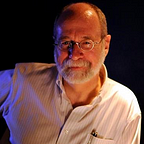The testimony and the tweet
Last week’s testimony by Cassidy Hutchinson before the Jan. 6 committee offered a warning about the state of democracy and — inadvertently — the state of journalism.
The testimony was a sensation befitting the anticipation of the hearing, which had been announced with great urgency and on short notice.
Journalists and analysts trotted out “blockbuster” and “bombshells” to describe the hearing, which added to the perception in many quarters that the committee was having an impact on the public discussion of the Jan. 6, 2021, attack on the U.S. Capitol.
The importance of Hutchinson’s testimony could be measured by how quickly allies of former President Donald Trump set out to undermine it. And the state of Washington journalism was reflected in how willing some reporters were to participate.
After the hearing, many legal experts focused on the increased jeopardy faced by Trump as a result of the testimony. He had been told repeatedly he had lost the election, yet he had a team working on plans to derail the process of certifying that vote, officially electing Joe Biden as the next president.
And on that day, aware that some in the crowd were armed, he implored them to march to the Capitol with the aim of halting the official proceedings.
But it was a detail in Hutchinson’s testimony, unimportant to the broader case, that caught the attention of the press: She testified of being told Trump had gotten physical in his attempt to get his Secret Service driver to take him to the Capitol rather than back to the West Wing.
That bit of color got a lot of play from journalists. And that’s where the pushback from Trump allies focused.
Shortly after Hutchinson completed her testimony, NBC News White House correspondent Peter Alexander tweeted:
“A source close to the Secret Service tells me both Bobby Engel, the lead agent, and the presidential limousine/ SUV driver are prepared to testify under oath that neither man was assaulted and that Mr. Trump never lunged for the steering wheel.”
The tweet and the stories that followed shifted the focus for a time from Trump’s behavior to Hutchinson’s credibility, and advocates leapt to their respective barricades.
But it also left more than one disinterested journalist cringing at Alexander’s judgment.
For me, the incident brought back the memory of a regular meeting of the managing editors of my last newsroom, where we all agreed that, as a matter of good journalism, we would not let an unnamed source disparage an opponent or a proposal without an extraordinarily good reason; some editors were adamant that there could be no such reason. You don’t allow people to take a whack at someone else behind a veil of anonymity.
Which is exactly what Alexander did.
Hutchinson testified under oath, in public. Alexander’s tweet wasn’t even a denial: just that someone “close to the secret service” said the other people involved would be willing to deny it. An arms-length denial without authority, without responsibility.
Journalists in Washington face enormous competitive pressures. Had Alexander insisted on an on-the-record statement from the participants before running anything, a competitor likely would have been eager to take his place.
But caving to that pressure — or worse, responding to it without a second thought — implicitly ducks any responsibility for the impact of the information you’re conveying. The item was a distraction — all heat, no light. It served the needs of one side in a political conflict — not the needs of the public.
It appears unlikely that the kerfuffle significantly has changed the impact of Hutchinson’s testimony. We’ll see.
But Alexander’s tweet contributes to a cynical view of the press — the “I don’t believe anything I read” crowd — and makes it harder to create good-faith public discussion of the things that matter to us most as a community.
This originally appeared as the column One Dog Barking in Citizencartwright.com.
